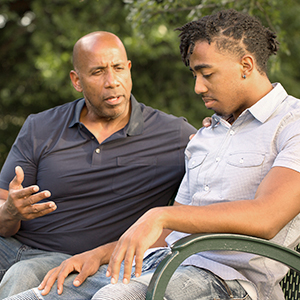Tips for Parents with College-Bound Teens
Sending your teen off to college is a significant milestone for the entire family.
By Maureen Tillman, LCSW

In addition to preparing them for the responsibilities that come with college and independence, parents should discuss how to manage distractions as well as expectations.
Sure, there are indicators of success. However, many young adults who are expected to excel, fail miserably when they run into the many stressors that occur in college settings.
College students who are accustomed to frequent monitoring at home are overwhelmed when they get on campus and often don’t seek help until it’s too late. What’s more, parents and their teenagers don’t always focus on sharpening the emotional skills that will serve them well in their new environment.
Teens starting college need to develop self-awareness and what it takes for them to succeed in life — academically, emotionally, and socially — and how to make that happen.
How do parents begin this process?
Evaluate how much monitoring and support your teen has from you and other adults.
- For example, are they getting themselves ready for school daily, or are you? That is, do you wake them up, do their laundry, run their errands, make their appointments?
- Are you filling out their college applications and financial aid forms?
- Do they have tutors, therapists or a disability?
- Do they spend most of their time with a support team in school?
- Are you primarily responsible for making sure they are meeting their responsibilities? Deadlines?
- Are you constantly reminding or monitoring their time and activities?
Find time to talk to them.
- Tell them that starting college can be a major adjustment and for them to be ready they need to begin taking responsibility for their own obligations.
- Tell them what they will need to foster their own independence. Brainstorm with your teen on what they can begin doing for themselves that they are used to you doing for them.
- Discuss creating a new support team on campus that mirrors the support they feel they are presently receiving.
- Ask if they have any worries or concerns about going off to college. Listen to their concerns, brainstorm for solutions, obtain information. Talk to a professional in the field now when they are still in your “orbit.”
- Get the facts. For resources on challenges at college as well as a successful transition, visit collegewithconfidence.com
Lastly, parents need to normalize their teens’ feelings while keeping abreast of changes in sleeping habits, appetites, level of energy, concentration, mood, socialization, and substance use. If they’re living on campus, get the phone numbers of their roommate as well as the resident advisor. Above all, trust your gut reaction and consult a mental health professional on campus or someone you trust locally when you sense problems.